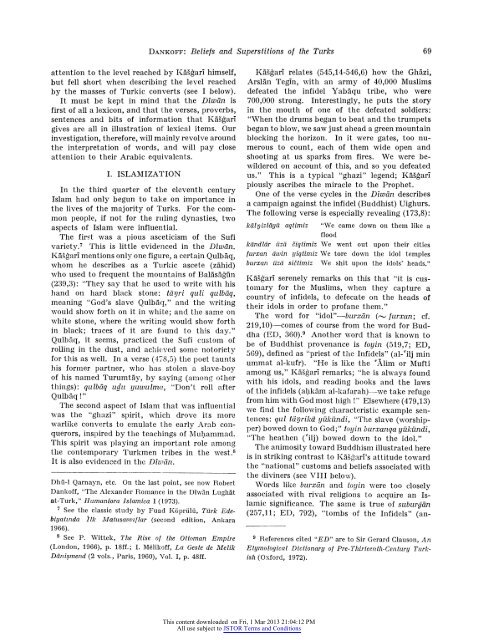Kashgari on the Beliefs and Superstitions of the Turks
Kashgari on the Beliefs and Superstitions of the Turks
Kashgari on the Beliefs and Superstitions of the Turks
You also want an ePaper? Increase the reach of your titles
YUMPU automatically turns print PDFs into web optimized ePapers that Google loves.
DANKOFF: <strong>Beliefs</strong> <strong>and</strong> Superstiti<strong>on</strong>s <strong>of</strong> <strong>the</strong> <strong>Turks</strong><br />
69<br />
attenti<strong>on</strong> to <strong>the</strong> level reached by Kasgari himself,<br />
but fell short when describing <strong>the</strong> level reached<br />
by <strong>the</strong> masses <strong>of</strong> Turkic c<strong>on</strong>verts (see I below).<br />
It must be kept in mind that <strong>the</strong> Diwdn is<br />
first <strong>of</strong> all a lexic<strong>on</strong>, <strong>and</strong> that <strong>the</strong> verses, proverbs,<br />
sentences <strong>and</strong> bits <strong>of</strong> informati<strong>on</strong> that Kasgari<br />
gives are all in illustrati<strong>on</strong> <strong>of</strong> lexical items. Our<br />
investigati<strong>on</strong>, <strong>the</strong>refore, will mainly revolve around<br />
<strong>the</strong> interpretati<strong>on</strong> <strong>of</strong> words, <strong>and</strong> will pay close<br />
attenti<strong>on</strong> to <strong>the</strong>ir Arabic equivalents.<br />
I. ISLAMIZATION<br />
In <strong>the</strong> third quarter <strong>of</strong> <strong>the</strong> eleventh century<br />
Islam had <strong>on</strong>ly begun to take <strong>on</strong> importance in<br />
<strong>the</strong> lives <strong>of</strong> <strong>the</strong> majority <strong>of</strong> <strong>Turks</strong>. For <strong>the</strong> comm<strong>on</strong><br />
people, if not for <strong>the</strong> ruling dynasties, two<br />
aspects <strong>of</strong> Islam were influential.<br />
The first was a pious asceticism <strong>of</strong> <strong>the</strong> Sufi<br />
variety.7 This is little evidenced in <strong>the</strong> Diwdn.<br />
Kasgari menti<strong>on</strong>s <strong>on</strong>ly <strong>on</strong>e figure, a certain Qulbaq,<br />
whom he describes as a Turkic ascete (zahid)<br />
who used to frequent <strong>the</strong> mountains <strong>of</strong> Balasguin<br />
(239,3): "They say that he used to write with his<br />
h<strong>and</strong> <strong>on</strong> hard black st<strong>on</strong>e: tdpri quli qulbaq,<br />
meaning "God's slave Qulbaq," <strong>and</strong> <strong>the</strong> writing<br />
would show forth <strong>on</strong> it in white; <strong>and</strong> <strong>the</strong> same <strong>on</strong><br />
white st<strong>on</strong>e, where <strong>the</strong> writing would show forth<br />
in black; traces <strong>of</strong> it are found to this day."<br />
Qulbaq, it seems, practiced <strong>the</strong> Sufi custom <strong>of</strong><br />
rolling in <strong>the</strong> dust, <strong>and</strong> achieved some notoriety<br />
for this as well. In a verse (478,5) <strong>the</strong> poet taunts<br />
his former partner, who has stolen a slave-boy<br />
<strong>of</strong> his named Turumtay, by saying (am<strong>on</strong>g o<strong>the</strong>r<br />
things): qulbaq udu yuwulmia, "D<strong>on</strong>'t roll after<br />
Qulbaq !"<br />
The sec<strong>on</strong>d aspect <strong>of</strong> Islam that was influential<br />
was <strong>the</strong> "ghazi" spirit, which drove its more<br />
warlike c<strong>on</strong>verts to emulate <strong>the</strong> early Arab c<strong>on</strong>querors,<br />
inspired by <strong>the</strong> teachings <strong>of</strong> Muhammad.<br />
This spirit was playing an important role am<strong>on</strong>g<br />
<strong>the</strong> c<strong>on</strong>temporary Turkmen tribes in <strong>the</strong> west.8<br />
It is also evidenced in <strong>the</strong> Diwdin.<br />
Dhfi-l Qarnayn, etc. On <strong>the</strong> last point, see now Robert<br />
Dank<strong>of</strong>f, "The Alex<strong>and</strong>er Romance in <strong>the</strong> Diwan Lughat<br />
at-Turk," Humaniora Islamica I (1973).<br />
7 See <strong>the</strong> classic study by Fuad Kopriilii, Turk Edebiyatznda<br />
ilk Matusavviflar (sec<strong>on</strong>d editi<strong>on</strong>, Ankara<br />
1966).<br />
8 See P. Wittek, The Rise <strong>of</strong> <strong>the</strong> Ottoman Empire<br />
(L<strong>on</strong>d<strong>on</strong>, 1966), p. 18ff.; I. M1lik<strong>of</strong>f, La Geste de Melik<br />
Ddnismend (2 vols., Paris, 1960), Vol. I, p. 48ff.<br />
Kasgari relates (545,14-546,6) how <strong>the</strong> Ghazi,<br />
Arslan Tegin, with an army <strong>of</strong> 40,000 Muslims<br />
defeated <strong>the</strong> infidel Yabaqu tribe, who were<br />
700,000 str<strong>on</strong>g. Interestingly, he puts <strong>the</strong> story<br />
in <strong>the</strong> mouth <strong>of</strong> <strong>on</strong>e <strong>of</strong> <strong>the</strong> defeated soldiers:<br />
"When <strong>the</strong> drums began to beat <strong>and</strong> <strong>the</strong> trumpets<br />
began to blow, we saw just ahead a green mountain<br />
blocking <strong>the</strong> horiz<strong>on</strong>. In it were gates, too numerous<br />
to count, each <strong>of</strong> <strong>the</strong>m wide open <strong>and</strong><br />
shooting at us sparks from fires. We were bewildered<br />
<strong>on</strong> account <strong>of</strong> this, <strong>and</strong> so you defeated<br />
us." This is a typical "ghazi" legend; Kagari<br />
piously ascribes <strong>the</strong> miracle to <strong>the</strong> Prophet.<br />
One <strong>of</strong> <strong>the</strong> verse cycles in <strong>the</strong> Diwin describes<br />
a campaign against <strong>the</strong> infidel (Buddhist) Uighurs.<br />
The following verse is especially revealing (173,8):<br />
kdlyizldyii aqtimiz "We came down <strong>on</strong> <strong>the</strong>m like a<br />
flood<br />
kdindldr iizd ciqtimiz We went out up<strong>on</strong> <strong>the</strong>ir cities<br />
furxan dwin yiqtimiz We tore down <strong>the</strong> idol temples<br />
burxan iizd sictimiz We shit up<strong>on</strong> <strong>the</strong> idols' heads."<br />
Kasgari serenely remarks <strong>on</strong> this that "it is customary<br />
for <strong>the</strong> Muslims, when <strong>the</strong>y capture a<br />
country <strong>of</strong> infidels, to defecate <strong>on</strong> <strong>the</strong> heads <strong>of</strong><br />
<strong>the</strong>ir idols in order to pr<strong>of</strong>ane <strong>the</strong>m."<br />
The word for "idol"-burxdn (, furxan; cf.<br />
219,10)-comes <strong>of</strong> course from <strong>the</strong> word for Buddha<br />
(ED, 360).9 Ano<strong>the</strong>r word that is known to<br />
be <strong>of</strong> Buddhist provenance is toyin (519,7; ED,<br />
569), defined as "priest <strong>of</strong> <strong>the</strong> Infidels" (al-'ilj min<br />
ummat al-kufr). "He is like <strong>the</strong> 'Alim or Mufti<br />
am<strong>on</strong>g us," Kasgari remarks; "he is always found<br />
with his idols, <strong>and</strong> reading books <strong>and</strong> <strong>the</strong> laws<br />
<strong>of</strong> <strong>the</strong> infidels (ahkalm al-kafarah)-we take refuge<br />
from him with God most high I" Elsewhere (479,13)<br />
we find <strong>the</strong> following characteristic example sentences:<br />
qul td?rikd yiikiindi, "The slave (worshipper)<br />
bowed down to God;" toyin burxanqa yiikiindi,<br />
"The hea<strong>the</strong>n ('ilj) bowed down to <strong>the</strong> idol."<br />
The animosity toward Buddhism illustrated here<br />
is in striking c<strong>on</strong>trast to Kisgari's attitude toward<br />
<strong>the</strong> "nati<strong>on</strong>al" customs <strong>and</strong> beliefs associated with<br />
<strong>the</strong> diviners (see VIII below).<br />
Words like burxdn <strong>and</strong> toyin were too closely<br />
associated with rival religi<strong>on</strong>s to acquire an Islamic<br />
significance. The same is true <strong>of</strong> suburgan<br />
(257,11; ED, 792), "tombs <strong>of</strong> <strong>the</strong> Infidels" (an-<br />
9 References cited "ED" are to Sir Gerard Claus<strong>on</strong>, An<br />
Etymological Dicti<strong>on</strong>ary <strong>of</strong> Pre-Thirteenth-Century Turkish<br />
(Oxford, 1972).<br />
This c<strong>on</strong>tent downloaded <strong>on</strong> Fri, 1 Mar 2013 21:04:12 PM<br />
All use subject to JSTOR Terms <strong>and</strong> C<strong>on</strong>diti<strong>on</strong>s
















